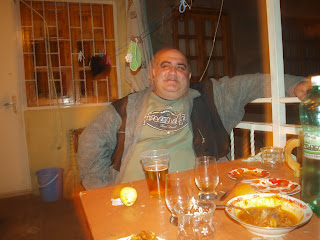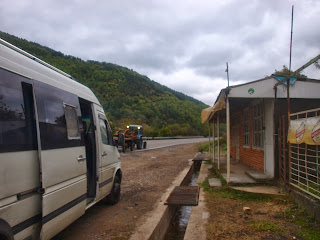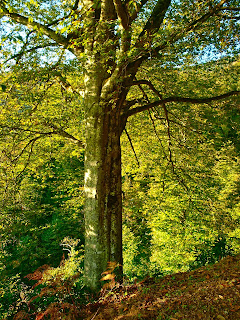I want to share with my readers a piece of creative nonfiction that I wrote about an experience I had in Georgia last year, while traveling there on Spring Break with a friend who was on the same study abroad program as me in Saint Petersburg, Russia.
The setting sun bathed the buildings in a soft, peach glow. The road, if you could call it that, split into dozens of impossibly angled alleys - steep, pockmarked, and narrow. Clotheslines hung between open windows and the air was fragrant with spice. I turned right, squeezing past the crookedly parked, rusting white Lada, and the three men standing around the open hood. Voices drifted down from the balconies that littered the neighborhood, settling down to the ground in a way that made me feel unafraid. The language was thick and musical - it was unlike anything I had ever heard. Georgian was ancient, unique only to that region, and unrelated to any other language in the world. I could not help but smile, it burst onto my face like a clap of thunder. This was the language that I wanted to learn; this was the place that I wanted to be: a small corner of the world that barely experienced the breath of foreigners.
I did not know where I was going at that particular moment. Having
not picked up a map of the city anywhere, I had only left my little
hotel with directions to Rustaveli Avenue, the main thoroughfare in
Tbilisi, Georgia. At that particular moment, standing up on the hill
in a break between buildings beneath a pomegranate tree, I could see
Rustaveli Avenue sparkle in the distance. Cupping the camera that
hung securely around my neck, I raised it to eye level and snapped a
picture of the very heart of the city, Liberty Square, its gold
column glistening in the light of the setting sun. Beyond that I
could see the ragged peaks of the Caucasus Mountains.
 |
View of the Old Tbilisi Sulphur Baths District
and Peace Bridge (the glass structure) |
“Hey, Greta.” My friend, Ely, sidled up beside me and proudly
showed me a picture he had just taken. Ely had come along with me
almost on a whim, impressed by the fact that I had planned this trip
on my own and had chosen a place that was not well known to the
outside the world. In fact, he had told me quite frankly before
leaving our study abroad homes in Saint Petersburg, Russia that
although he had heard of Georgia, he did not know anything about it.
I did not care; I was just pleased that I had company and had someone
with whom I could share my knowledge of the region. Not only that, I
was pleased to have someone come along with me, as I probably could
not have and would not have wanted to make this trip alone. I am not
one to fear traveling, visiting, and exploring new places, it was
just safer to have someone along with me. We were pioneers for our
study abroad program as no one in its fifty-year history had ever
gone to Georgia before. In a way, this was my trip – this region,
the Caucasus, held special meaning in my heart and I was here for
several reasons. The simplest reason was that I had wanderlust and a
love for exploring exotic, not very well known places. I love
experiencing the local, cultural flavor and that sometimes means
going off the beaten track. The more complicated reason was that I
wanted to feel the region out, I have had an interest in the place
for close to ten years – prompted by a news segment about conflict
in a little town called Beslan in the North Caucasus – and I wanted
to make sure my heart was in the right place.
Suddenly, a soccer ball came whizzing out from a shadowy passage
with a group of children tumbling after it. They all stopped when
they saw Ely and me, their eyes bright, wide, and curious. “Hello,”
said one of the girls in hesitant English, the corners of her lips
flickering upwards.
“Gamarjoba,”
I responded back with one of the only Georgian words that I knew.
The girl startled, then scampered off to catch her friends, her rich
dark hair glinting in the sun.
Ely and I ambled on for a few more minutes, marveling at the warmth
of that early April evening. It made me happy to know that Ely also
had a desire to experience the exotic and the unknown. Instead of
staying in a bulky Western-style hotel, we stayed at a little
hole-in-the-wall place that was nestled in the heart of Tbilisi's Old
Town. Only a few blocks away stood a magnificent Georgian Orthodox
cathedral called the Holy Trinity, but closer, just spending a lot of morning time staring
out the window, I observed stray cats and dogs. A man retiled a
roof, a woman cooked in a kitchen, and a young girl readied for
school. It was wonderful just to be able to inhale the fresh
mountain air and feel the warmth of the spring sun on my face. I
knew Ely agreed with me. As I was about to take a picture, a man
leaning out over the railing of his balcony caught my attention.
“Privet!”
The man shouted down in Russian with a wide warm grin on his face.
“Come and have a drink!”
Glancing at Ely, I frowned. “I don't know about this. Let's keep
wandering.”
“Come! Drink!” The man called out again, waving us up, his
grandchildren playfully jumping up and down the stairs.
I shook my head as emphatically as I possibly could. “No, thank
you!” It was hard for me to fathom what was unfolding before me. I
had always heard of the supposedly legendary hospitality of the
Georgian people - that guests were considered blessings, that
Georgians were sincere, ready, and willing to share feasts with
complete strangers. This was something that happened in travel
books, to others, but to me? I shook me head again, wondering how I
could make this man realize that Ely and I were just passing through.
The man would not have any of it – he clapped his hands against the
railing, then swung his arms up into the air, his smile growing ever
wider. “Come!”
Ely
glanced at me, eyebrows raised, his pupils flickering with
consideration. His wanderlust and need for the exotic was getting
the better of him. This was what happened when you spent time with
Ely just as when you spent time with me – we are both willing to do
interesting things, different things, things that many people would
not think to do. Both he and I had determined, without ever
expressing it verbally to one another, that this man had probably
never seen foreigners come up this way before. Most foreigners, or
should I say tourists,
stayed on the main drag drinking in bars or were already in their
hotel rooms in some Marriot, trying to find a television channel
in English. But that was definitely not us. Again, Ely raised his
eyebrows. “What do you think? Let's just go.”
For a moment more, I thought about what to do and then I remembered
one of the reasons I had wanted to travel to Georgia in the first
place – I wanted to experience its culture. Reluctantly I nodded,
my heart fluttering as I followed Ely onto the first creaky wooden
stair up to the man's home.
“Hello!” The plump, jovial man said again in Russian as Ely and I
reached the balcony. “My name is Shota. I am named after the
great Georgian poet, Shota Rustaveli.” He motioned for us to sit
down at the two open chairs that happened to be there across from him
at the small table.
 |
| Our host. |
We introduced ourselves and when we told him that we were both
American, his face lit up.
Within less than a minute, there were two glasses in front of Ely and
me, filled to the brim with Georgian white wine. There were also
plates filled with lamb, cheese, bread, and fresh vegetables.
Before we could start eating however, Shota raised his glass for a
toast. “To my new American friends!”
I took a sip of wine, watching carefully from the rim of my glass as
Shota drained the wine into the back of his throat in one gulp. I
took a bigger sip.
As soon as I set my glass down, Shota reached over and poured more
wine into my glass.
Georgians are known to be masterful hosts – masterful in making any
guest feel welcome. Drinking, eating, and toasting are all serious
art forms and are as much a part of the Georgian culture as its
religion, dance, and music.
Ely tried to speak to Shota, but the words that fell from his mouth
were jumbled and incomprehensible. “Greta, how do I ask Shota
about his family in Russian?”
My heart began to palpitate in my chest as I interpreted his question
to Shota, the Russian sailing from my lips with an ease and
confidence that I had never quite felt before. It was exhilirating
to be able to speak solely in Russian; English could not be used as a
safeguard, for Shota and his family did not know it.
During a lull in the conversation, I turned in my chair and gazed
down at the city. Anywhere in America the view would be worth
millions, but in Georgia – a country clearly still developing –
it belonged to Shota. By what I could gather, Shota was no where
close to being a wealthy man or even middle class. It did not
matter. I tried to spot all the different churches and mosques and
synagogues that rose mightily above the homes in the Old Tbilisi
neighborhood – they glowed more prominently than any of the other
buildings in the city, a true mark of the country's multi-cultured
heritage. The Mtkvari River cut through the heart, the ragged cliffs
reaching up one side now enveloped by shadows as the sun ducked below
the horizon.
“My love!” Shota exclaimed, raising his arms up as his wife
emerged onto the balcony, carrying a basket of freshly baked bread.
“We need more wine.”
Shota's wife glanced at Ely and I, and smiled warmly, as if seeing
two Americans sitting on her porch was something that was a normal
occurrence.
That night, Shota was the Tamada, the artful toastmaster of our
Georgian feast. His body seemed to swell with immense pride and his
eyes danced with hope and happiness. This was a role in which he
felt comfortable and at ease. “I want to make another toast.”
A warm breeze tickled my cheek as I raised my glass once more. In
that moment, I knew in my heart that I had made the right choice,
that ten years of study had been validated, and that there was no
other place on earth that I would have rather been in that moment. I
did not know that it was possible to fall even more in love with that
country – but I did.
“May you enjoy your stay in Georgia...and come again tomorrow
night!”
Copyright 2013






































